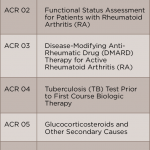Dr. Charles King II, rheumatologist at IMA-Tupelo Rheumatology & Osteoporosis Center, began contributing data to RISE and immediately saw a benefit. “With RISE, I was able to quickly and easily assess my performance and discovered patient care gaps,” says Dr. King. “Because our patients are our No. 1 priority, we quickly acted to fill the gap to improve patient care and improve patient outcomes.”
Innovative tools, such as RISE, help us focus on what matters the most—the patients. Truly, we are working together to discover solutions and transform care in rheumatology. To get your practice started with RISE, contact the ACR at [email protected].
 E. William St.Clair, MD, is president of the ACR and chief of the Duke Division of Rheumatology and Immunology. Dr. St.Clair, a rheumatologist, has 25 years of experience as a clinical investigator. Contact him at [email protected].
E. William St.Clair, MD, is president of the ACR and chief of the Duke Division of Rheumatology and Immunology. Dr. St.Clair, a rheumatologist, has 25 years of experience as a clinical investigator. Contact him at [email protected].



